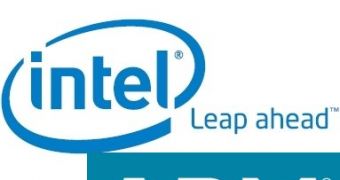The recent few months we've seen the ultra-portable, low-power, low-energy mobile machines called netbooks gaining a lot of market share, which attracted in the game both PC vendors and chip manufacturers. Currently, on the chip side, Intel's Atom processor has the lead, yet the UK-based IP firm ARM is also known to be aggressively targeting the same market segment with its own processors.
Considering the interest the two have on this market segment, some PC vendors thought of creating hybrid solutions which would combine the best of both sides while optimizing the features offered by Intel and ARM. Such hybrid solution would include one processor from each side, gaining a lot on energy efficiency with the ARM chip which could be used for Internet applications such as email and web browsing, and boosting performance with the use of the Intel CPU for power-intensive office productivity applications.
Back in August, Dell demonstrated its Dell Latitude ON, a new technology that, according to the company, was able to offer near-instant access to e-mail, calendar, attachments, contacts and the Web without needing to boot into the system's main operating system (OS). According to Dell, the dedicated low-voltage ARM sub-processor was able to provide multi-day battery life. Moreover, the PC maker announced plans to include the ARM processor into its Latitude E4200 and E4300 models.
Industry watchers countered that the possibilities offered by devices like PDAs could not match those of a notebook, which means that the market would always seek for laptops able to offer 15 hours of battery life. Hybrid solutions will have to use a dual-OS design, limiting users to working on a single OS at a time. Even so, things may change in the not too far future, as ARM has been working on the software support for its processors in the mobile segment. Next year, ARM-based processors will see Ubuntu Linux and Adobe Flash 10.
Dell is not the only PC vendor to experiment with hybrid solutions. Asustek Computer is also taking steps in that direction, yet focusing more on the boot-up time of Windows. The company is talking about its ExpressGate technology, a software solution running on Linux kernel said to boot up in five seconds and featuring applications such as photo viewing and sharing, Internet access, chat and email.
Hybrid CPU solutions resemble a lot the latest advancements in the graphics industry, where hybrid IGP/discrete GPU solutions are experimented to offer the best features for energy saving and performance.

 14 DAY TRIAL //
14 DAY TRIAL //